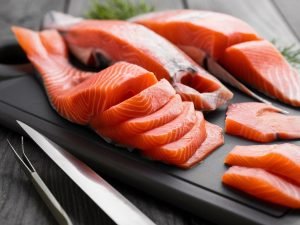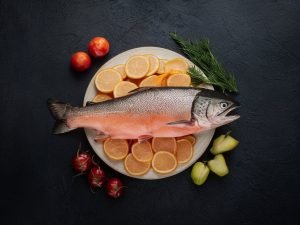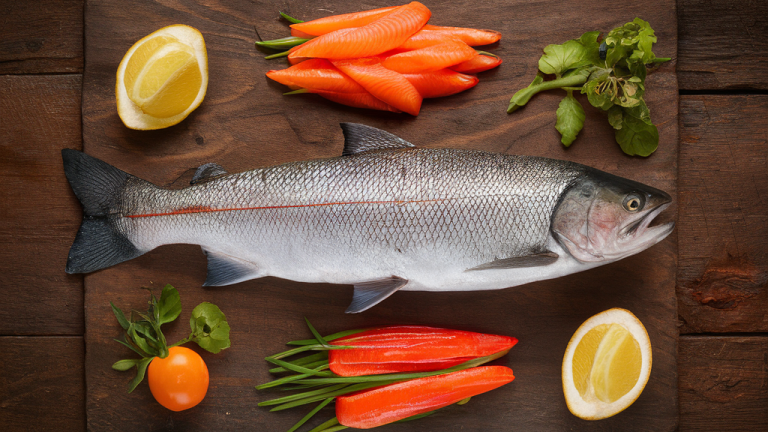Introduction to Salmon Fish
Salmon is more than just a popular seafood choice; it’s a versatile, nutrient-packed fish that has been a staple in diets worldwide for centuries. Renowned for its rich flavor and impressive health benefits, salmon continues to capture the hearts of chefs, nutritionists, and food enthusiasts alike.
Types of Salmon
Wild vs. Farmed Salmon
Salmon is typically categorized into two types: wild and farmed. Wild salmon is caught in natural habitats like oceans, rivers, and lakes. It’s prized for its robust flavor and firm texture. Farmed salmon, on the other hand, is raised in controlled environments, making it more accessible and often more affordable. Each type has its own unique qualities and benefits, catering to different preferences and budgets.
Varieties of Salmon
There are several species of salmon, each with distinct characteristics:
- Chinook (King) Salmon: Known for its high fat content and rich flavor.
- Sockeye (Red) Salmon: Recognized by its deep red flesh and strong taste.
- Coho (Silver) Salmon: Valued for its delicate flavor and medium fat content.
- Pink Salmon: The most common variety, often used in canned products.
- Chum (Dog) Salmon: Typically less fatty and often used in smoked preparations.

Nutritional Benefits of Salmon
Salmon is a powerhouse of nutrients that can significantly benefit your health. Here are some of the key nutritional highlights:
Rich in Omega-3 Fatty Acids
One of the most significant benefits of salmon is its high omega-3 fatty acid content. Omega-3s are essential for heart health, reducing inflammation, and supporting brain function. Regular consumption of salmon can help lower the risk of heart disease and improve cognitive health.

High-Quality Protein
Salmon is an excellent source of high-quality protein, which is crucial for muscle repair and growth. A single serving of salmon can provide over half of the daily recommended protein intake, making it an ideal choice for those looking to increase their protein consumption.
Packed with Vitamins and Minerals
Salmon is rich in essential vitamins and minerals, including:
- Vitamin D: Supports bone health and immune function.
- Vitamin B12: Important for nerve function and the production of red blood cells.
- Selenium: A powerful antioxidant that helps protect cells from damage.

Culinary Uses of Salmon
Grilling and Baking
Salmon’s firm texture makes it perfect for grilling and baking. Whether marinated with herbs and spices or simply seasoned with salt and pepper, these cooking methods bring out the natural flavors of the fish.
Sushi and Sashimi
Salmon is a favorite in Japanese cuisine, especially for sushi and sashimi. Its buttery texture and mild flavor make it ideal for raw preparations, allowing the quality of the fish to shine.
Smoked Salmon
Smoked salmon is a delicacy enjoyed worldwide. It’s often served on bagels with cream cheese, in salads, or as part of a charcuterie board. The smoking process imparts a unique, savory flavor that enhances the natural taste of the fish.
Sustainable Seafood Choices
As demand for salmon continues to rise, it’s essential to make sustainable choices. Look for certifications like the Marine Stewardship Council (MSC) for wild-caught salmon and the Aquaculture Stewardship Council (ASC) for farmed salmon. These certifications ensure that the salmon is sourced responsibly, minimizing environmental impact and promoting the well-being of fish populations.

Salmon is a versatile, delicious, and nutritious fish that deserves a place in any diet. Whether you’re enjoying it grilled, baked, raw, or smoked, the benefits of incorporating salmon into your meals are undeniable. By choosing sustainably sourced salmon, you can enjoy this wonderful fish while supporting environmental and ecological health. Dive into the world of salmon and discover the myriad of flavors and health benefits it has to offer!
